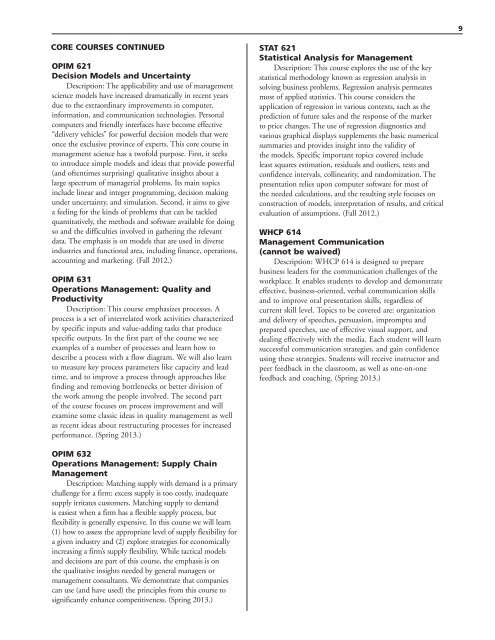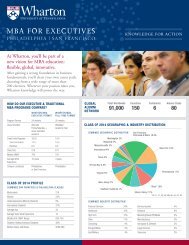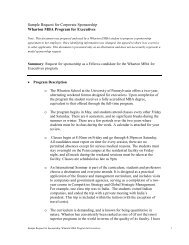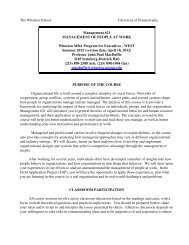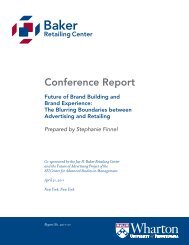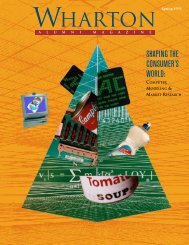Resource Guilde Class 38_rev.indd - The Wharton School of the ...
Resource Guilde Class 38_rev.indd - The Wharton School of the ...
Resource Guilde Class 38_rev.indd - The Wharton School of the ...
- No tags were found...
You also want an ePaper? Increase the reach of your titles
YUMPU automatically turns print PDFs into web optimized ePapers that Google loves.
9Core Courses ContinuedOPIM 621Decision Models and UncertaintyDescription: <strong>The</strong> applicability and use <strong>of</strong> managementscience models have increased dramatically in recent yearsdue to <strong>the</strong> extraordinary improvements in computer,information, and communication technologies. Personalcomputers and friendly interfaces have become effective“delivery vehicles” for powerful decision models that wereonce <strong>the</strong> exclusive province <strong>of</strong> experts. This core course inmanagement science has a tw<strong>of</strong>old purpose. First, it seeksto introduce simple models and ideas that provide powerful(and <strong>of</strong>tentimes surprising) qualitative insights about alarge spectrum <strong>of</strong> managerial problems. Its main topicsinclude linear and integer programming, decision makingunder uncertainty, and simulation. Second, it aims to givea feeling for <strong>the</strong> kinds <strong>of</strong> problems that can be tackledquantitatively, <strong>the</strong> methods and s<strong>of</strong>tware available for doingso and <strong>the</strong> difficulties involved in ga<strong>the</strong>ring <strong>the</strong> relevantdata. <strong>The</strong> emphasis is on models that are used in diverseindustries and functional area, including finance, operations,accounting and marketing. (Fall 2012.)OPIM 631Operations Management: Quality andProductivityDescription: This course emphasizes processes. Aprocess is a set <strong>of</strong> interrelated work activities characterizedby specific inputs and value-adding tasks that producespecific outputs. In <strong>the</strong> first part <strong>of</strong> <strong>the</strong> course we seeexamples <strong>of</strong> a number <strong>of</strong> processes and learn how todescribe a process with a flow diagram. We will also learnto measure key process parameters like capacity and leadtime, and to improve a process through approaches likefinding and removing bottlenecks or better division <strong>of</strong><strong>the</strong> work among <strong>the</strong> people involved. <strong>The</strong> second part<strong>of</strong> <strong>the</strong> course focuses on process improvement and willexamine some classic ideas in quality management as wellas recent ideas about restructuring processes for increasedperformance. (Spring 2013.)STAT 621Statistical Analysis for ManagementDescription: This course explores <strong>the</strong> use <strong>of</strong> <strong>the</strong> keystatistical methodology known as regression analysis insolving business problems. Regression analysis permeatesmost <strong>of</strong> applied statistics. This course considers <strong>the</strong>application <strong>of</strong> regression in various contexts, such as <strong>the</strong>prediction <strong>of</strong> future sales and <strong>the</strong> response <strong>of</strong> <strong>the</strong> marketto price changes. <strong>The</strong> use <strong>of</strong> regression diagnostics andvarious graphical displays supplements <strong>the</strong> basic numericalsummaries and provides insight into <strong>the</strong> validity <strong>of</strong><strong>the</strong> models. Specific important topics covered includeleast squares estimation, residuals and outliers, tests andconfidence intervals, collinearity, and randomization. <strong>The</strong>presentation relies upon computer s<strong>of</strong>tware for most <strong>of</strong><strong>the</strong> needed calculations, and <strong>the</strong> resulting style focuses onconstruction <strong>of</strong> models, interpretation <strong>of</strong> results, and criticalevaluation <strong>of</strong> assumptions. (Fall 2012.)WHCP 614Management Communication(cannot be waived)Description: WHCP 614 is designed to preparebusiness leaders for <strong>the</strong> communication challenges <strong>of</strong> <strong>the</strong>workplace. It enables students to develop and demonstrateeffective, business-oriented, verbal communication skillsand to improve oral presentation skills, regardless <strong>of</strong>current skill level. Topics to be covered are: organizationand delivery <strong>of</strong> speeches, persuasion, impromptu andprepared speeches, use <strong>of</strong> effective visual support, anddealing effectively with <strong>the</strong> media. Each student will learnsuccessful communication strategies, and gain confidenceusing <strong>the</strong>se strategies. Students will receive instructor andpeer feedback in <strong>the</strong> classroom, as well as one-on-onefeedback and coaching. (Spring 2013.)OPIM 632Operations Management: Supply ChainManagementDescription: Matching supply with demand is a primarychallenge for a firm: excess supply is too costly, inadequatesupply irritates customers. Matching supply to demandis easiest when a firm has a flexible supply process, butflexibility is generally expensive. In this course we will learn(1) how to assess <strong>the</strong> appropriate level <strong>of</strong> supply flexibility fora given industry and (2) explore strategies for economicallyincreasing a firm’s supply flexibility. While tactical modelsand decisions are part <strong>of</strong> this course, <strong>the</strong> emphasis is on<strong>the</strong> qualitative insights needed by general managers ormanagement consultants. We demonstrate that companiescan use (and have used) <strong>the</strong> principles from this course tosignificantly enhance competitiveness. (Spring 2013.)


